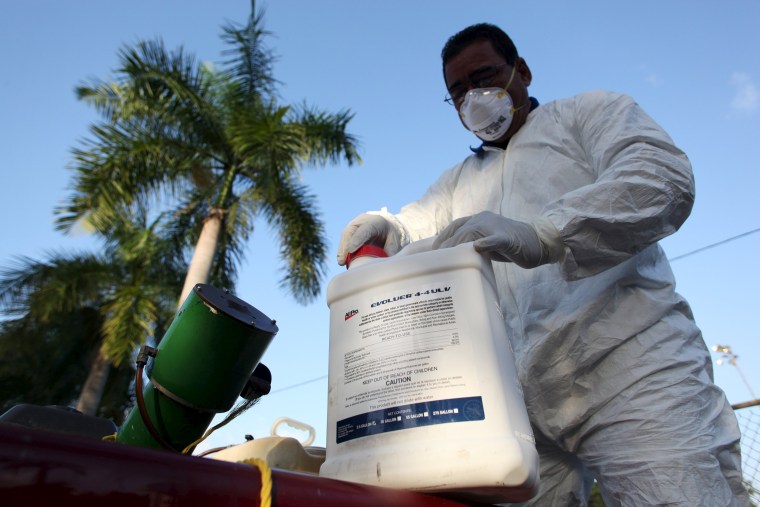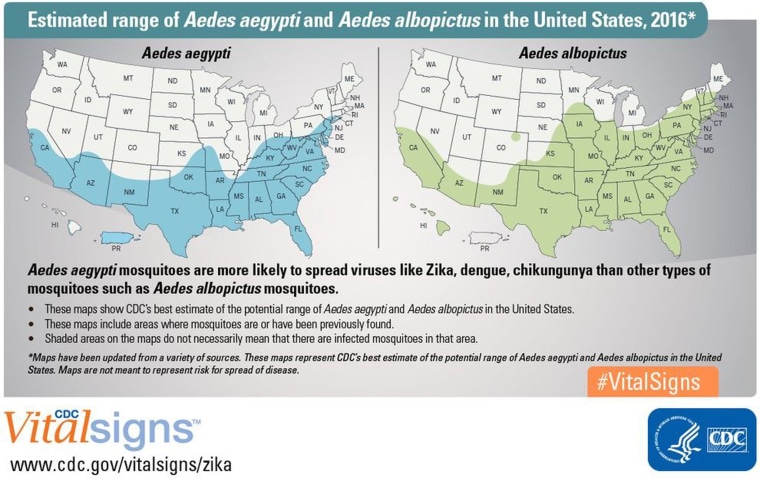Federal officials say they’re taking $500 million aimed at fighting Ebola to use against Zika instead because Congress won’t approve new funding.
They said the risk of Zika is too serious to wait for Congress to appropriate the $1.9 billion the Obama administration has asked for, so they are moving $589 from other projects for immediate Zika use. But they said they’d continue urging Congress to OK the full amount.
“Nearly two months have passed and the situation continues to grow more critical,” Shaun Donovan, director of the White House Office of Management and Budget, told reporters on a conference call.
RELATED: Congress Takes Spring Break Without Paying for Zika Fight
“Today we reiterate our call on Congress to take immediate action to provide the full requested amount. We must scale up Zika prevention activity right now.”
The White House didn’t detail how the $589 million would be spent. It said $510 million of the money would come from funds that had been allocated to fight Ebola, which is still spreading at very low rates in West Africa.

But the Centers for Disease Control and Prevention, National Institutes of Health, U.S. Agency for International Development and other agencies have been working on various fronts.
They’re trying to develop a Zika vaccine; better tests to help doctors tell if someone’s infected or has been infected with Zika; trying to understand just what kinds of birth defects Zika causes; studying whether and how often Zika causes a paralyzing condition called Guillain-Barré syndrome and working to help the families of babies born with Zika-connected birth defects.
They are also working to find better ways to control the mosquitoes that spread Zika and prepare U.S. states that may see Zika spread as the weather gets warmer.
“These repurposed funds are not enough to support a comprehensive Zika response and can only temporarily address what is needed,” Donovan said. “Emergency supplemental funding remains urgently needed.”
RELATED: Experts Urge Quick Movement on Zika
Top U.S. health officials made the unusual move of asking Congress last month to commit the money.
Republicans in Congress say they would consider paying the money back in future legislation if it's needed for Ebola or some other purposes.
"Currently, there are billions of dollars leftover that Congress appropriated to combat Ebola. Now that the World Health Organization has announced an end to the Ebola public health emergency, it is time to reprioritize and use these funds for today’s challenges," House majority leader Kevin McCarthy said in a statement.
"I support the Obama Administration’s decision to transfer this money to combat Zika. By doing this, we can protect against outbreaks without burdening the taxpayers further.”
The CDC and National Institutes of Health say the money is not "left over" and say it's needed to make sure Ebola, and other health threats, don't re-ignite.
The strongly divided Congress is very unlikely to act quickly on a stand-alone emergency spending bill in an election year. Congress approved about $5 billion in 2014 for Ebola.
Nearly 700 Americans already have been infected with Zika, a usually harmless virus that’s carried by the same mosquitoes that spread yellow fever and dengue. That includes at least 64 pregnant women, Health and Human Services Secretary Sylvia Burwell said.
Doctors are still working to understand when women are most at risk and what percentage of Zika-exposed pregnant women will go on to have babies with birth defects.

New studies are finding that Zika can destroy the developing brain of the fetus, perhaps damaging other organs, also. More than 40 million Americans travel to and from Zika-affected regions every year. Not only are many of them pregnant women, but many are men who can carry the virus back and infect a pregnant wife or partner.
“I think it is a concern for the nation,” Burwell said.
The CDC published new maps last week showing the Aedes aegypti mosquito that transmits Zika can be found as far north as New York City, San Francisco and Kansas City in the summer. With about 4 million babies both in the U.S. each year, there’s a real risk of birth defects.
Burwell said it can cost anywhere between $1 million and $10 million to care for a child born with microcephaly, a catastrophic birth defect in which the brain doesn’t develop properly. Some babies die soon after birth while those that survive need various degrees of care, depending on their impairment.
“The American people shouldn’t have to be panicked for Congress to do their job."
“The American people shouldn’t have to be panicked for Congress to do their job,” Donovan said.
Burwell said the CDC had counted 323 cases of Zika in travelers, almost all of them to the 48 continental U.S. states. Another 325 were in Puerto Rico residents with 24 in other U.S. territories including American Samoa and the U.S. Virgin Islands.
An actively infected person can spread Zika in two ways: if a mosquito bites and carries the virus, or sexually.
“We believe that there will likely be local transmission in the continental United States in the spring and summer months,” Burwell said.
“We can’t really wait to act.”
Burwell says the money is needed to help states get mosquito control efforts under way and to help study new and better ways to tackle mosquitoes, as well as for research into vaccines tests and treatments for Zika.
“Without this funding we do risk undermining our ability to respond,” she said.
“These efforts need to continue and they can’t be stopped or shortchanged. We don’t have the option to set one aside in favor of the other.”
Many members of Congress have said the U.S. doesn’t need to be spending million to fight Ebola now that only a few cases are being reported. At the height of the epidemic, Ebola was affecting thousands in Guinea, Liberia and Sierra Leone. More than 28,000 people were infected and more than 11,000 died.
Two people came infected and undetected to the U.S. – Thomas Eric Duncan, who died and who infected two nurses who treated him, and Dr. Craig Spencer, infected while treating Ebola patients in Guinea whose symptoms started after he returned home to the U.S.
“There are not enough existing resources to address the threat of both Ebola and the Zika virus."
U.S. experts say as long as any disease is circulating anywhere, there’s a risk travelers can bring it to the U.S. and they say local hospitals need to be ready.
“There are not enough existing resources to address the threat of both Ebola and the Zika virus,” said Heather Higginbottom, deputy secretary for management and resources at the State Department.
“Ebola remains a threat to global health.”
Last week, state and local health officials told a CDC meeting that they do not have the money or know-how to prepare for Zika alone.
“We’ve had so many kind of threats in the last five to 10 years (and) we know more are coming,” Dr. Ed Ehlinger, state health commissioner for Minnesota, told reporters last week.
“Most people don't know the majority of public health services that are provided in the state are federally funded,” Ehlinger added.
“We need that federal support and because we are already at a deficit in many of our funding sources leading to inefficient responses to needs and demand, like in my state, Ebola, Lyme disease, west Nile virus, plus the floods and the tornadoes and the lead testing in water — Zika added to the pressures in our jurisdictions.”
